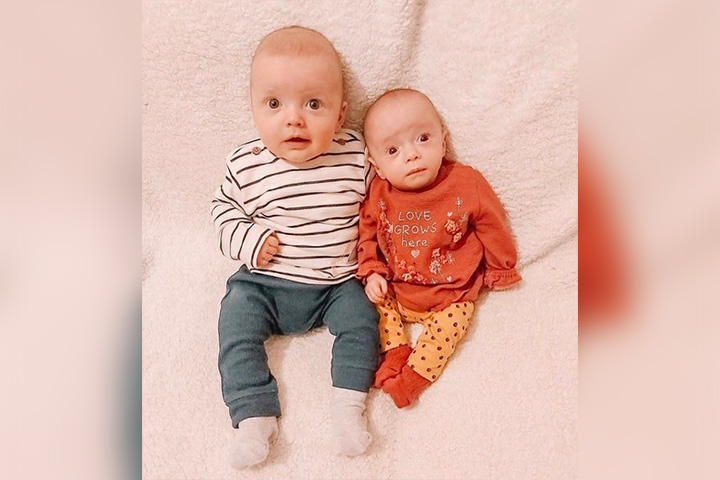
Rebecca Roberts and Rhys Weaver were ecstatic. The fertility treatment they underwent proved successful, and they were all set to become parents. Little did they know that their joy was about to be doubled…literally! Soon, Rebecca became pregnant with another child while she was still carrying her first baby! And what’s more, to her surprise, by the end of the pregnancy, both her little ones were born together, despite being conceived close to three weeks apart! The happy couple are proud parents of super twins, and the rest of the world is having a jaw-dropping moment at this unique phenomenon!
When asked about her reaction to the news of her double pregnancy, Rebecca said that she and her partner were extremely shocked. They found out about their second baby when they were doing an ultrasound of the first baby at twelve weeks.
Rebecca wasn’t the only one who was shocked, though — the doctors were equally puzzled and surprised, more so when they realized baby number two was conceived three weeks apart. Initially, Rebecca’s healthcare provider, Dr. David Walker, thought it was a common slip when he missed the second twin. There are plenty of cases where doctors have missed out on the second child when a mother is carrying twins, but soon enough, Dr. Walker understood that this was not the case.
Although both Rebecca and Rhys were thrilled, there was no denying that they were concerned. They shared how worried they were when they got the news because there was very little information about superfetation. Given it’s extremely rare, they couldn’t exactly watch and learn what to do either. In fact, at one point, the doctors also warned the parents, saying that there may be chances that the second baby wouldn’t survive.
It was a harrowing ordeal for them, as the odds were against Rosalie, their second baby. Their first, Noah, seemed to be doing okay. At one point, they faced a serious complication when Rosalie began facing problems with her umbilical cord. This prevented her from growing and the placenta from developing. It wasn’t easy, but they somehow made it.
In September last year, Rebecca gave birth to both her little ones. The first few weeks were crucial, and more so with super twins, the babies spent most of their time in the NICU. Noah stayed there for around three weeks and weighed a good four pounds and ten ounces when he was born. Rosalie weighed half, at two pounds and seven ounces. She stayed in the hospital for much longer — ninety-five days! The good news is that she is back home to be with her baby brother, and we can’t be happier for the family of four!
The Super Science Behind Superfetation
Superfetation is a rare occurrence when a woman can get pregnant with another child during the course of an already existing pregnancy. In this case, an egg, different from the first, is also fertilized by another sperm. Soon, this egg gets implanted in the womb, and you’re carrying another child! In most cases, babies who are conceived like this are born together. These babies are called “super twins”.
Incidentally, superfetation has been observed mostly in women undergoing fertility treatments such as In-Vitro Fertilization. However, even amongst them, such an occurrence is extremely rare. Superfetation is common in certain animal species, such as badgers, hares, and fish, but not in humans (1).
Should You Be Worried?
Image: The Washington Post
Rebecca did worry a lot when she knew it was a case of superfetation, and we don’t blame her. It is rare, so there’s not much information available to help you understand what you’re dealing with. The most prevalent and unavoidable complication of superfetation is that both babies grow and develop at different rates, so one baby will be born prematurely (2).
The baby conceived later may face certain challenges such as low birth weight, breathing problems, coordination and movement issues, and struggle when being fed. The expectant mother too may face certain challenges such as a spike in blood pressure or gestational diabetes. Also, the chances are that it will have to be a C-section birth (3).
The best way to prevent superfetation is by avoiding intercourse after you have conceived. Having said that, we’d like to emphasize again that superfetation is an extremely rare occurrence. Plenty of women continue having intercourse even after being pregnant, and there is little to no risk associated with this.
We’re surprised at how things turned out for Rebecca, but we’re also overjoyed. The happy mother has actively been sharing the development of both her children on her social media handles. From what we see, both Rosalie and Noah are hale and hearty, and we’re proud of them! What are your thoughts on this? Let us know in the comments below.














